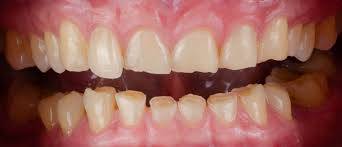Bruxism is a condition characterized by teeth grinding or clenching, often occurring during sleep. Here are 20 potential causes, 20 signs, 10 effects, and 10 solutions related to bruxism:
**Causes of Bruxism:**
1. Stress and Anxiety
2. Misaligned Teeth
3. Sleep Disorders (e.g., sleep apnea)
4. Alcohol and Drug Use
5. Caffeine Intake
6. Smoking and Tobacco Use
7. Medications (e.g., antidepressants)
8. Dental Issues (e.g., missing teeth)
9. Genetics (family history)
10. Abnormal Bite
11. Neurological Conditions
12. Age (more common in children)
13. Diet and Nutrition
14. Excessive Gum Chewing
15. Excessive Alcohol Consumption
16. Temporomandibular Joint (TMJ) Disorders
17. Dental Restorations (e.g., crowns)
18. Allergies
19. Hyperactivity
20. Medical Conditions (e.g., epilepsy)
**Signs of Bruxism:**
1. Teeth Grinding Noises During Sleep
2. Worn Tooth Enamel
3. Tooth Sensitivity
4. Jaw Pain or Soreness
5. Facial Pain
6. Earaches
7. Headaches (especially in the morning)
8. Tight or Tired Jaw Muscles
9. Chipped or Cracked Teeth
10. Tongue or Cheek Damage
11. Tension in Neck and Shoulders
12. Sleep Disruption (for self or partner)
13. Disrupted Sleep Patterns
14. Inflammation of Gums
15. Changes in Bite
16. Enlarged Jaw Muscles
17. Braces Damage
18. Restricted Jaw Movement
19. Grinding Marks on Teeth
20. Development of TMJ Disorder Symptoms
**Effects of Bruxism:**
1. Tooth Damage
2. Tooth Sensitivity and Pain
3. TMJ Disorders
4. Chronic Headaches
5. Sleep Disturbances
6. Ear and Facial Pain
7. Gastrointestinal Problems (related to stress)
8. Jaw Disorders
9. Gum Recession
10. Increased Dental Bills
**Solutions and Prevention:**
1. Stress Management Techniques (e.g., meditation, yoga)
2. Behavioral Therapy
3. Dental Splints or Mouthguards
4. Relaxation Exercises
5. Cognitive Behavioral Therapy (CBT)
6. Medications for Anxiety or Muscle Relaxation (prescribed by a doctor)
7. Correcting Dental Issues (e.g., braces)
8. Avoiding Stimulants (e.g., caffeine, alcohol)
9. Limiting Gum Chewing
10. Establishing a Bedtime Routine
11. Sleep Hygiene Practices
12. Dental Check-ups
13. Biofeedback
14. Hypnotherapy
15. Physical Therapy (for TMJ)
16. Adjusting Medications (under medical supervision)
17. Acupuncture
18. Avoiding Chewing on Non-Food Items (e.g., pens)
19. Breathing Exercises
20. Lifestyle Changes to Reduce Stress
Consulting with a dentist or healthcare provider is crucial for a proper diagnosis and the development of a personalized treatment plan for bruxism.It normally affect children



No comments yet
Be the first to share your thoughts!